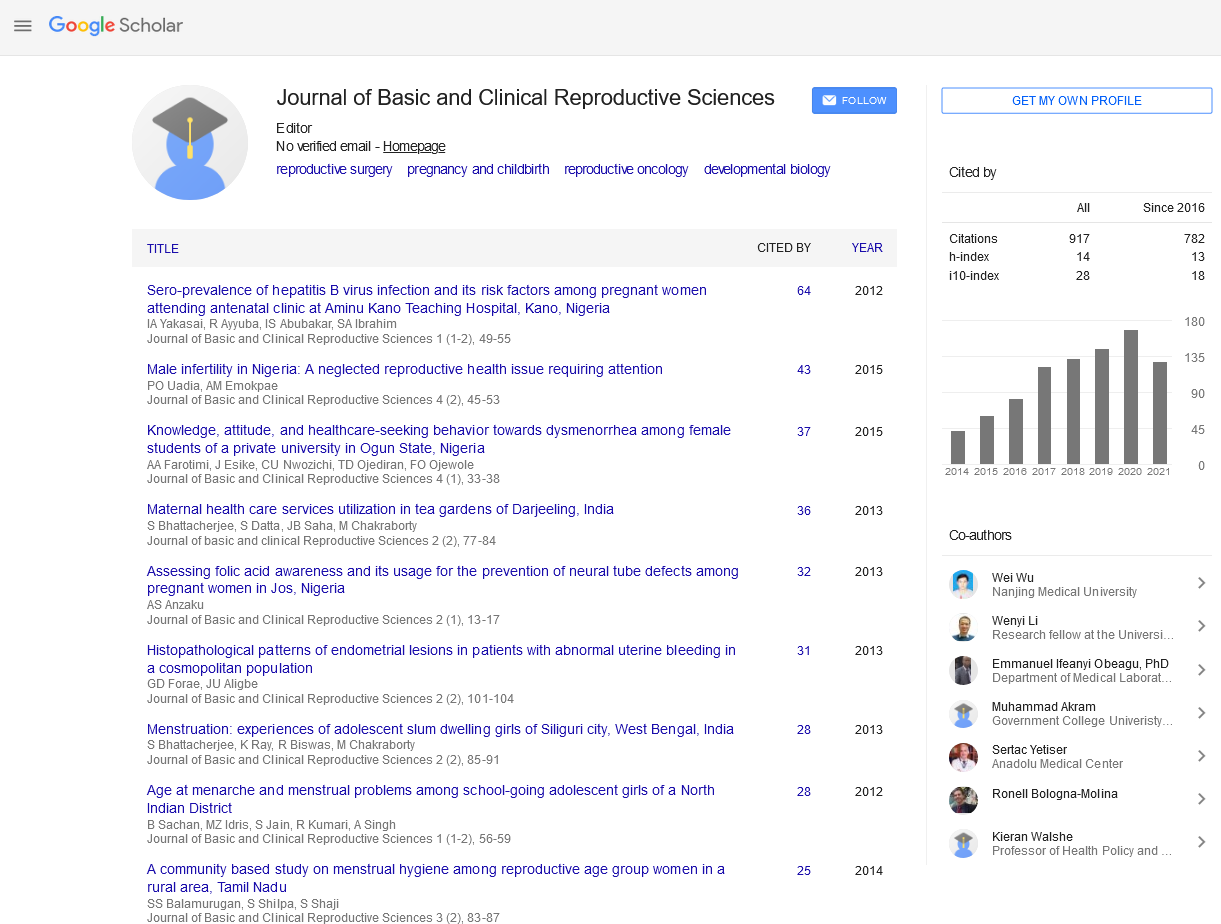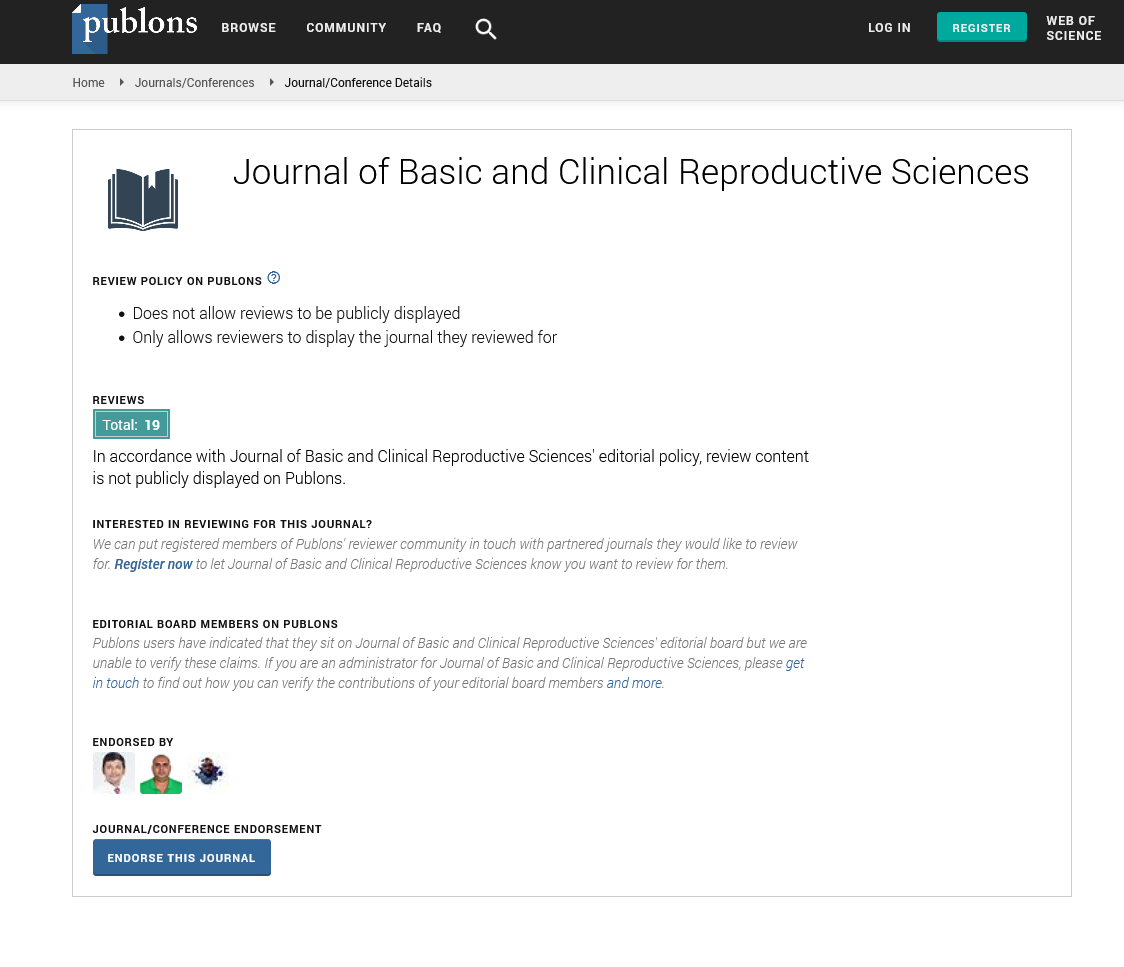Opinion - Journal of Basic and Clinical Reproductive Sciences (2023) Volume 12, Issue 2
Prenatal Diagnosis: Advancements and Implications for Fetal Health
Received: 29-Mar-2023, Manuscript No. JBCRS-23-99698; Editor assigned: 31-Mar-2023, Pre QC No. JBCRS-23-99698 (PQ); Reviewed: 14-Apr-2023 QC No. JBCRS-23-99698; Revised: 21-Apr-2023, Manuscript No. JBCRS-23-99698 (R); Published: 28-Apr-2023
This open-access article is distributed under the terms of the Creative Commons Attribution Non-Commercial License (CC BY-NC) (http://creativecommons.org/licenses/by-nc/4.0/), which permits reuse, distribution and reproduction of the article, provided that the original work is properly cited and the reuse is restricted to noncommercial purposes. For commercial reuse, contact reprints@pulsus.com
Description
Prenatal diagnosis has revolutionized the field of reproductive medicine by enabling the detection of fetal abnormalities and genetic disorders during pregnancy. This manuscript provides a comprehensive overview of the various prenatal diagnostic techniques, including ultrasound, maternal serum screening, and invasive procedures such as amniocentesis and chorionic villus sampling. It explores the benefits and limitations of these diagnostic tools, as well as the ethical considerations associated with prenatal testing. Furthermore, this manuscript highlights the significant impact of prenatal diagnosis on fetal health management, parental decision-making, and the future of personalized medicine.
Prenatal diagnosis refers to the evaluation of the developing fetus during pregnancy to detect potential abnormalities or genetic disorders. The ability to diagnose fetal conditions in utero has transformed prenatal care, allowing for early intervention and informed decision-making. This manuscript aims to provide a comprehensive overview of the techniques used in prenatal diagnosis, their benefits, limitations, and the ethical considerations associated with prenatal testing. Furthermore, it explores the impact of prenatal diagnosis on fetal health management and the implications for personalized medicine.
Non-Invasive Prenatal Screening (NIPS) utilizes maternal blood samples to assess the risk of certain chromosomal abnormalities, such as Down syndrome (trisomy 21) and Edwards syndrome (trisomy 18). NIPS is based on the detection of fetal cell-free DNA fragments in the maternal circulation. While NIPS offers high sensitivity and specificity, it is important to recognize its limitations, including the potential for false positives and false negatives. NIPS results are typically followed by confirmatory diagnostic procedures.
Ultrasound remains one of the most widely used prenatal diagnostic tools. It provides detailed imaging of the developing fetus, allowing for the detection of structural abnormalities, assessment of fetal growth, and evaluation of placental function.
Advances in ultrasound technology, such as 3D and 4D imaging, have enhanced diagnostic capabilities and improved prenatal counseling. However, ultrasound has its limitations, and certain abnormalities may be difficult to detect, necessitating further diagnostic procedures.
Invasive procedures, such as amniocentesis and Chorionic Villus Sampling (CVS), involve the sampling of fetal cells or tissues for genetic analysis. Amniocentesis is typically performed in the second trimester and involves the aspiration of amniotic fluid for chromosomal and genetic testing. CVS, performed in the first trimester, involves the biopsy of placental tissue for similar purposes. These procedures provide a definitive diagnosis but carry a small risk of complications, such as miscarriage, making careful consideration of the risks and benefits essential.
Prenatal diagnosis raises several ethical considerations, including the right to know versus the right not to know, the potential psychological impact on parents, and the ethical implications of selective termination of pregnancies with diagnosed abnormalities. Genetic counseling and comprehensive informed consent processes are vital in navigating these ethical complexities, ensuring the autonomy and well-being of parents while upholding the principles of beneficence and non-maleficence.
Prenatal diagnosis plays a crucial role in fetal health management, facilitating early interventions, including fetal surgeries and medical treatments. It also enables parents to make informed decisions regarding the continuation or termination of pregnancies affected by severe genetic disorders. Furthermore, prenatal diagnosis contributes to the development of personalized medicine by guiding the selection of appropriate interventions and enabling the identification of novel therapeutic targets for fetal conditions.
Prenatal diagnosis has revolutionized prenatal care, allowing for the early detection and management of fetal abnormalities and genetic disorders. While various diagnostic techniques offer valuable insights into fetal health, each has its advantages, limitations, and ethical considerations.


